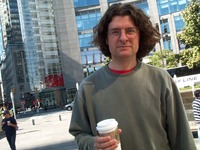Advice for potential students
Professor A.J. de Jong, Columbia university, Department of Mathematics.
I will be a demanding advisor, more demanding than most (Ravi Vakil).

How does it work?
I've had quite a few students work with me, but I still don't have a fixed recipe. The best thing to do is to come and find me in my office and start talking. For example, I like quick technical questions, especially if you've tried to work out what to do yourself. Please don't think your question "isn't worth asking". Of course, it works well if you attend the graduate student seminar I run or a course I give and we end up talking about math that way.What areas?
What area of research will you be working on? It should have something to do with commutative algebra, algebraic geometry, or number theory. But the precise area depends completely on you. It would be wonderful if you have a suggestion for a problem. If you focus on a problem and work hard, then something interesting will come out. So I think that in some sense the initial problem doesn't matter too much. What I have done a few times in the past is suggest three problems to students. Usually what ends up happening is that there is a natural tendency to gravitate towards one of them and that ends up being the topic of research. Anyway, the key is to find something that you find interesting.List of research topics of students
Each of these topics requires a kind of lengthy explanation. In fact one of the problems about being a graduate student is to overcome the initial fear of just starting to work on something that you really don't understand that well (but somebody is telling you could be very interesting). Here is a list of some things my students have worked on.- Counting rational curves on hypersurfaces over finite fields (Thibaut Pugin),
- Vector bundles on curves over finite fields (Yanhong Yang),
- Cristalline cohomology and jumps in Newton polygons (Yanhong Yang),
- Intersection theory on algebraic stacks (Zachary Maddock),
- Derived categories of smooth projective varieties (Alice Rizzardo),
- Rational curves on low degree hypersurfaces (Xuanyu Pan),
- Shimura curves and how to define them in characteristic p > 0 (Xia Jie),
- Modular forms (Alex Ghitza),
- Rational curves on Del Pezzo surfaces (Damiano Testa),
- Vector bundles + maps between P^1's (Brian Osserman),
- Curves over dvrs (Jongmin Lee),
- Foundations for higher algebraic stacks (Josh Nichols-Barre),
- Moduli of Cohen-Macaulay curves (Morten Honson),
- Brauer groups of surfaces and derived Azumaya algebras (Max Liebliech),
- Deformations of group schemes (Zhaohui Zhang),
- Noncommutative polynomial algebras (Ian Caines),
- Shimura varieties (Ben Moonen -- advisor Frans Oort and I helped),
- Overconvergent F-isocrystals (Kiran Kedlaya),
- Lines on hypersurfaces (Roya Behesthi),
- When do maps exist between nonsingular hypersurfaces (David Sheppard),
- Specialization in the picard group of a surface over a curve (Yogishwar Maharaj),
- Chow varieties and a question of Barry Mazur (Joe Ross),
- Rational curves on cubic hypersurfaces in P^n for n>8 (Matt DeLand),
- Rational curves on Fano threefolds (Mingmin Shen),
- Rational curves on varieties in positive characteristic (Mingmin Shen),
- Derived direct summand conjecture (Bhargav Bhatt).